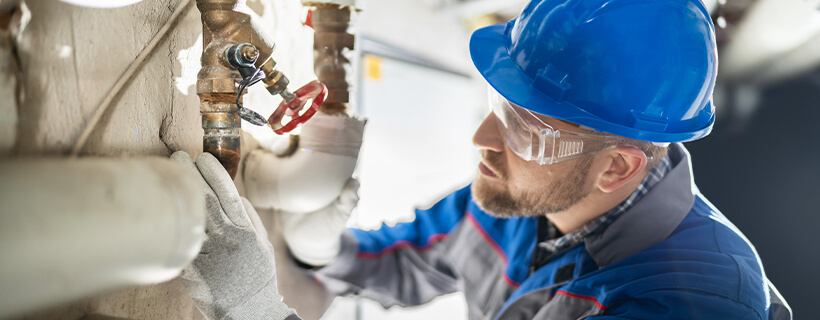Plumber Jobs in New Zealand

What does a Plumber do?
A Plumber installs, maintains, and repairs water, gas, sanitation, drainage, air conditioning and roofing systems depending on their area of expertise.
What skills does a Plumber need to have?
The skills required to be a Plumber centre around installation, maintenance and repair processes for the water supply, heating, and sanitation of a building. There are several different types of plumbing including mechanical, sanitary, drainage, maintenance, and roof related services. There are common core and technical skills across each discipline, but there are also specific requirements which are unique to each respective aspect.
Mechanical
Mechanical plumbing involves the installation, maintenance and repair of air conditioning and heating systems. This includes the unit and any necessary piping or duct work. A mechanical Plumber should be able to determine the specifications and dimensions required for installation through interpreting the blueprints of the respective air conditioning or heating system.
Knowledge of evaporator and condenser coils in air conditioning units is required to complete installation effectively. The same applies to VRV (Variable Refrigerant Volume) or VRF technology (Variable Refrigerant Flow) which are designed to reduce energy consumption. A sufficient understanding of the above ensures that a Plumber can work competently across all systems including ducted, split system and bulkhead units.
Sanitary
Sanitary plumbing related to discharge pipes, sanitary stacks, sewerage pump sets, drainage, and disposal systems. A Sanitary Plumber will also need the acquired knowledge and skills to clear blockages, rough-in water supply and pipes along with install appliances and accessories.
Drainage
Despite sharing similar elements with sanitary plumbing, drainage plumbing requires additional expertise. This includes being able to install drainage systems both above ground and in-ground, along with connecting stormwater and sanitary drainage systems. Training and certification to use excavation and other machinery is necessary to complete the drainage processes.
Maintenance
A large portion of plumbing work is either installation or repairs, and the importance of ongoing maintenance cannot be underestimated. A Plumber needs to have a certain general knowledge of building and construction. This is useful when clearing blocked drains, dealing with hot water systems and gas maintenance. They are also regularly required to service and replace taps and household appliances including dishwashers and washing machines. Identifying leaks and the source of them is another critical aspect. This is most often related to wet areas such as bathrooms and kitchens.
Roof
Plumbing is not limited to drainage systems that run at or below the surface. Those with expertise roofing and gutters are in many cases required to have plumbing qualifications. This covers a wide range of tasks such as cladding, laying roof sheets, capping, and flashing. The installation, maintenance and repair of down pipes and gutters is another key component.
Plumber job responsibilities
- Install, maintains, and repair water, gas, sanitation, drainage, air conditioning and roofing systems
- Interpret blueprints and specifications for pipe construction and layout, drainage systems and other plumbing requirements
- Set out and install hot and cold water systems
- Ability to use hand and power tools including drills, saws, snips, squares, crimps, and welding equipment in a safe manner
- Work in collaboration with contractors and other trades professionals to meet the requirements of the plumbing assignment
- Identify and repair leaks in plumbing related areas
- Install appliances and accessories
- Follow all relevant safety guidelines and procedures
Skills and experience employers are looking for
A Certificate III in Plumbing accompanied by an apprenticeship is viewed as an essential requirement by employers. There is an expectation that in the process of achieving these qualifications, a Plumber will have developed their core and technical skills to include the following:
Core Skills
- Logical and clear thinker
- Problem solving and analytical skills
- Strong attention to detail
Technical Skills
- Install, maintain and repair plumbing systems
- Install, maintain, connect and repair appliances and accessories
- Proficiency using tools and instruments and reading blueprints in an accurate manner
Core Skills
It is essential for a Plumber to complete tasks in a logical and clear manner. After the Plumber has analysed the blueprints, it is important to be able to install the relevant systems in a timely manner while being able to recognise any associated issues that may arise. This may involve placing piping in an efficient way which allows drainage to occur, or to inform the relevant parties that there must be alterations to the blueprints for the system to function properly.
The completion of a Certificate III in Plumbing includes an apprenticeship, and it is during this learning phase where employers expect Plumbers to have developed problem solving and analytical skills. Those who can find a quick and timely resolution to plumbing issues will be viewed upon favourably.
The previously mentioned core skills all work in tandem with having a strong attention to detail. This is a valuable skill which ensures that a job is completed in an accurate, cost-effective, and timely manner. A high standard of work prevents delays or the requirement to return and make alterations – two factors which employers do not want to occur.
Technical Skills
The major technical skill for a Plumber is the ability to install, maintain and repair pipes. This ranges from measuring and cutting pipes to the required size, clearing the piping of blockages and repairing any damaged piping.
Similarly, employers expect a Plumber to be have the skills required to install, maintain, and repair appliances such as heating systems, air conditioning units, dishwashers and washing machines. This could be as simple as having the necessary knowledge of how these systems and appliances work. In specific cases such as that of mechanical plumbing and air conditioning, being able to install duct work and pipes or run drainage from the unit would be viewed favourably.
Proficient and safe use of hand and power tools including drills, saws, snips, squares, crimps, and welding equipment is a mandatory requirement. The ability to seal any wet areas effectively and cleaning all areas appropriately will place you in a favourable position. Any experience completing leading projects or completed complicated tasks on your own should be mentioned in your resume.
What type of employers hire a Plumber?
Building and Construction – Drainage Plumbing is common in the building and construction industry where a large focus is on in ground drain hook ups, stormwater, and sanitary drainage system installation. Plumbers who want to work in the construction industry will need their White Card and have the training and certification to use excavation equipment and machinery.
Business – In most cases this is more of a maintenance roles as corporations and retail outlets require Plumbers to ensure that air conditioning units and any sanitary systems and in good working order.
Plumber qualifications
- Certificate III in Plumbing
- VBA license
- Completion of a plumbing apprenticeship
- White Card if applying for a plumbing role in the construction industry
- Driver’s Licence
How to become a Plumber in New Zealand
- Completion of a Certificate III (Certificate 3) in Plumbing.
- Hands on experience is crucial. Whether it is through an apprenticeship or work experience, knowledge of piping layouts and best drainage methods will be developed by experience on the job.
- Work on your core skills as they will set you out from the crowd. Employers are placing significant value on problem solving, logical thinking and an attention to detail.
- A White Card along with licenses to operate excavation equipment and machinery will provide additional employment opportunities.
- High proficiency in power and hand tools.
Create a job alert
Hays job alerts make your search for the ideal job as easy as possible.
Send us your CV
Check your salary
Find out if you're earning the salary you deserve with the Hays Salary Checker.
Check my salary now



